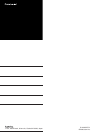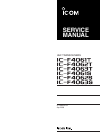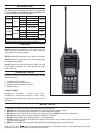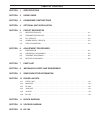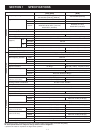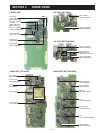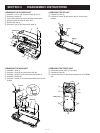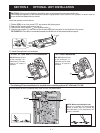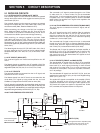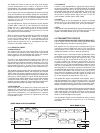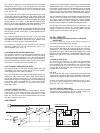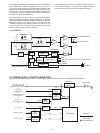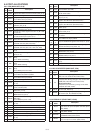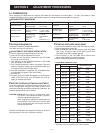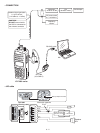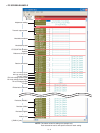
SECTION 5 CIRCUIT DESCRIPTION
5-1 RECEIVER CIRCUITS
5-1-1 ANTENNA SWITCH (MAIN and RF UNITS)
The received signals from the antenna connector are passed
through the antenna switch which toggles the receive (RX) line
and transmit (TX) line.
The received signals from the antenna connector are passed
through the low-pass fi lter (LPF; L601−L603, C601−C607), and
the antenna switch (D601, D602 and D603 are OFF).
While transmitting, the voltage on the T5V line is applied to
D601, D602 and D603, and these are ON. Thus the TX line
is connected to the antenna. Simultaneously, the RX line is
connected to the GND to prevent transmit signal entering.
While receiving, no voltage is applied to the D601, D602
and D603, and these are OFF. Thus the TX line and the
antenna is disconnected to prevent received signals entering.
Simultaneously, the RX line is disconnected from the GND and
the received signals are passed through the LPF (RF UNIT; L604,
C610, C611).
The fi ltered signals from the LPF (RF UNIT; L604, C610, C611)
are then applied to the RF circuit via the two staged tunable
bandpass fi lter (BPF; D21−D24, L31, L32, C120−C122, C125−
C127).
5-1-2 RF CIRCUIT (MAIN UNIT)
The received signals are filtered and amplified at the RF
circuit.
The fi ltered signals are applied to the RF amplifi er (Q10). The
amplifi ed signals are applied to the 1st mixer (Q9) via another two-
staged BPF (D28, D29, L33, L34, C141−C144, C147, C148).
5-1-3 1st IF CIRCUITS
The received signals are converted into the 1st IF signal, and
amplified at the 1st IF circuits.
The filtered signals from the RF circuit are converted into the
46.35 MHz 1st IF signal by being mixed with the 1st Local
Oscillator (LO) signals from the VCO at the 1st mixer (Q9).
The LO signals for 435/485 MHz (Low band/High band) and lower
frequencies are generated by the RX1 VCO (Q2, D5, D6, D8), and
the LO signals for 435/485 MHz (Low band/High band) and higher
frequencies are generated by the RX2 VCO (Q1, D1, D2).
The converted 1st IF signal is passed through the 1st IF fi lter
(in wide mode; FI1, in narrow mode; FI4) via the bandwidth
switch (D34), to remove adjacent signals. The filtered signal
is applied to the 1st IF amplifi er (Q25) via another bandwidth
switch (D35). The amplifi ed 1st IF signal is then applied to the
FM IF IC (IC3, pin 16).
5-1-4 2nd IF AND DEMODULATOR CIRCUITS (MAIN UNIT)
The 1st IF signal is converted into the 2nd IF signal, and de-
modulated.
The 1st IF signal from the 1st IF amplifi er (Q25) is applied to
the 2nd IF mixer in the FM IF IC (IC3, pin 16). And the 1st IF
signal is converted into the 450 kHz 2nd IF signal by being
mixed with the 2nd LO signal from the reference frequency
oscillator (X1) via the tripler (Q18).
The converted 2nd IF signal is output from pin 3, and passed
through the 2nd IF fi lter (FI2) to suppress sideband noise. In
narrow mode, the 2nd IF signal is also passed through another
2nd IF fi lter (FI3) via bandwidth switches (D32, D33).
The fi ltered 2nd IF signal is applied to the limiter amplifi er in
the FM IF IC (IC3, pin 5). The amplifi ed 2nd IF signal is FM-
demodulated at the quadrature detector (X5, IC3, pins 10, 11)
and output from pin 9. The demodulated AF signals are then
applied to the AF circuits.
5-1-5 AF CIRCUITS (FRONT and MAIN UNITS)
The demodulated AF signals from the FM IF IC are amplifi ed
and filtered at AF circuits. This transceiver employs the
base band IC for audio signal processing for both transmit
and receive. The base band IC is an audio processor and
composed of pre-amplifi er, compressor, expander, scrambler,
etc. in its package.
The demodulated AF signals from the FM IF IC (IC3, pin 9) are
applied to the base band IC (IC5, pin 23) via the Digital/Analog
switch (IC14, pins 2, 15).
The applied AF signals are amplifi ed at the amplifi er (RXA1)
and level adjusted at the volume controller (VR3), then
suppressed unwanted 3 kHz and higher audio signals at LPF.
The filtered AF signals are applied or bypassed the TX/RX
HPF, scrambler, de-emphasis sections in sequence.
5 - 1
D/A converter
(IC4)
Mixer
RSSI
Quadrature
detector
2
1
1st IF signal from the IF amplifier (Q25)
16
Noise
detector
+5V
X5
1110
FM IF IC (IC3)
Filter
amp.
Limiter
amp.
Demodulated signals
to the AF circuits
• 2nd IF AND DEMODULATOR CIRCUITS
9
“NOIS” signal to the CPU (IC18: pin 37)
“RSSI” signal to the CPU (IC18: pin 50)
13
12
Q18
X1
15.3 MHz
45.9 MHz
BPF
2
3
8
735
FI2
FI3
N/W
SW
N/W
SW
D33
D32



